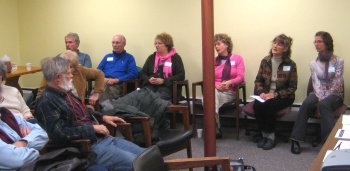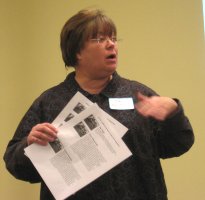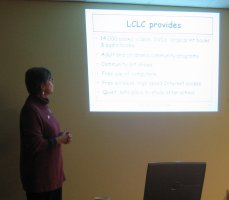- By Dan Veaner
- News
 Print
Print 
Click For Candidate Statements
The question LCLC will put before the taxpayers next Tuesday is whether they are willing to pony up 15 cents per $1,000 of assessed property per year to raise $105,310 to hire a professional librarian, pay operating costs, and grow the collection. For most residents that cost is about the cost of a new hardcover book. But naysayers charge that the 15 cents is the beginning of a slippery slope that will lead to spiraling library taxes in the future.

Candidates lined up to answer questions
 Candidates lined up to answer questions |  Deb Harper hosted the evening |
A chartered library is independent of other municipal taxing authorities. But because it must share the physical boundaries of a school district or a town, many voters were confused about what they were voting for. LCLC chose to become a School District Chartered Library, and the confusion with the school district, itself steeped in financial and other woes, may have contributed to the failed vote. Library officials say that after the vote last May many who voted against the library did so because they thought they were voting for another school library. It has been a challenge for LCLC to explain that the only connections to the school district are the physical boundaries of the district and the requirement for any vote establishing or changing a tax levy go through the school board.
Opponents to the library claim that a promise was made when the library was formed that it would always be supported by private donations. But Darfler says the goal was always to become chartered. "We wanted to become a chartered library," Darfler explained. "But New York State was not giving charters at that time."
Darfler also says that because of demand from the community it is no longer possible to run the library without a professional librarian and public funding. "It just grew out of control," she says. "1,500 books are circulated each month. People wanted this, they wanted that. We kept going until all of a sudden we weren't a reading room. We went back to New York State and the law had changed. It reopened the way we wanted to look at it seven years ago."
Officials are quick to point out that LCLC has been run in the black since its inception, with two capital improvement campaigns that raised a quarter of a million dollars to provide a space that meets the community's needs with no mortgage or other debt. The tax money would only be used for ongoing operating expenses, and officials say that being a chartered library will not only make LCLC eligible for grant money it cannot get now, but it will also bring money back to Lansing that taxpayers are paying anyway to the County and New York State.

Donna Scott presented facts about the vote
Fundraising co-chair Donna Scott noted that because the Tomkins County Public Library will begin charging its reading rooms for services on a per-use basis stating in January, LCLC would have been faced with a money crisis anyway. "We would have been in the same place no matter what, this year, because TCPL cut us off." Darfler agreed.
In addition to voting on whether to accept the tax, a board of directors will have to be established. Ten candidates are running for nine available seats. Each was introduced, and written statements were handed out (click here to read these brief campaign statements). Many questions were asked and answered, though those present seemed more interested in the tax vote than in the candidates.
What it will come down to is whether or not the community thinks having a public library is worth it. Currently LCLC has 2,500 patrons, more than 23% of Lansing's population. The collection stands at about 14,000 books, with 1,500 items being checked out in a month. Kids and adult programs abound, the meeting rooms are used by several not for profit groups within Lansing and the Town itself. If the people who take advantage of these services all come to vote the initiative will surely pass. The challenge for LCLC will be to get them out to vote.
----
v3i46



